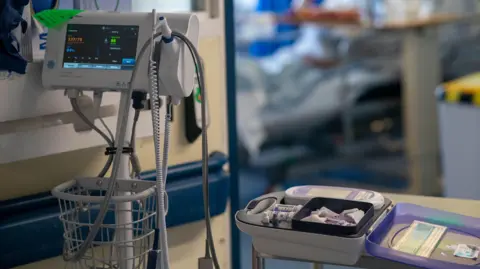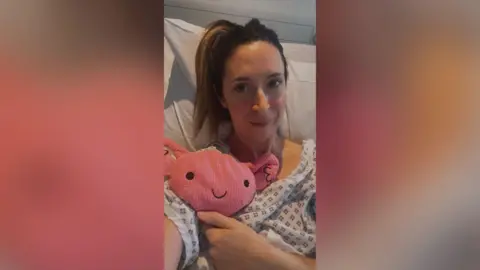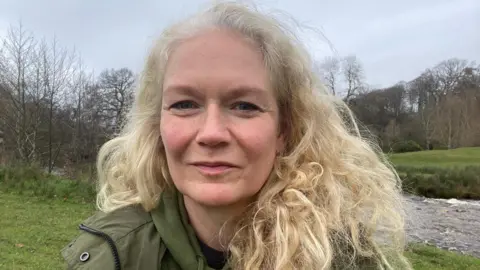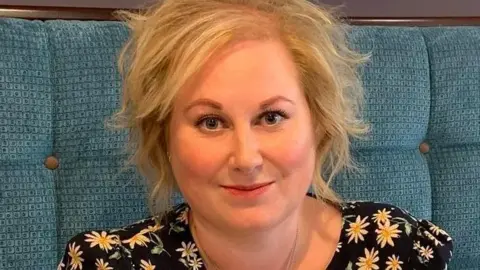 PA Media
PA MediaWhen the BBC reported that waiting lists for gynaecology appointments across the UK had more than doubled since February 2020, many women shared their experiences of how they feel forced to turn to private care.
Women waiting in agony for vital gynaecological treatment are turning to the private sector in the hope of being referred urgently to the top of the NHS waiting list.
The experiences of many who spoke to the BBC tie in with what we are hearing from people working in the sector.
The heads of 11 leading women’s health organisations have signed an open letter urging the public and health professionals to participate in their “Change NHS” conversation.
They said: “Women and girls have repeatedly been left to ‘fall through the gaps’ of fragmented government policy.”
The Royal College of Obstetricians and Gynaecologists says the discussion around the government’s 10-year health plan is a chance to lobby for “much needed” funding and system-wide support essential to transforming women’s health.
An NHS spokesperson said: “While latest data shows NHS staff are making progress to cut waiting lists and tackle the backlog, we know there is much more to do to bring down long waits for care, particularly for women who are waiting for crucial appointments and treatment.
“We welcome feedback from the public and those working in women’s health services via Change NHS to build on our work on improving services for women – which includes developing a network of women’s health champions in every local care system and expanding neighbourhood women’s health hubs across the country – giving thousands more women access to specialist women’s health teams in the community.”
Claire, 40: ‘I was told to suck on a Polo’
 Claire Lyness
Claire LynessForty-year-old mother Claire, had a hysterectomy – an operation where the womb is removed – 12 weeks ago.
The mother-of-one needed the surgery to relieve her “debilitating” endometriosis and adenomyosis.
The surgery cost Claire more than £10,000 with a private consultant – the same one she is on a three-year waiting list to see through the NHS.
“This was the last option, it was desperation,” she says.
Claire, a librarian, struggled to get anyone to take her pain seriously during her teenage years. It wasn’t until she was 22 that she received a diagnosis of severe endometriosis.
The diagnosis gave Claire, who had always been told her pains were related to an irritable bowel, hope. She recalls her mum being told by a doctor: “I think it’s just IBS. Get her to suck on a Polo mint.”
But the endometriosis diagnosis was just the beginning of a continuing battle for speedy NHS care.
“These [gynaecology] appointments are a lifeline for us,” she says. “We are in so much pain but we know it’s okay because in a few months we’ll be seeing this consultant or doctor, and then when they cancel it is heart-breaking.
“Out of every month I was getting one good week and around that it was about managing the pain and the emotional effects of that.”
Now Claire, who also suffers with premenstrual dysphoric disorder (PMDD), a period-related condition causing extreme distress, must weigh up how much to rely on costly private care as she continues her treatment.
“I know I’m in a privileged position to be able to have gone private,” she says.
“The nurses were amazing, the aftercare was all followed up, they referred me to physio. But I need to continue with the NHS now because otherwise, where does the cost end?”
Pippa, 50: ‘They opened me up and found a cyst the size of a brick’
 Pippa Cole
Pippa Cole“I am not the type of person to kick up a fuss,” says Pippa, a retired cafe owner.
She had felt “excruciating pain” in her abdomen for months, but after three repeat visits to her GP she was left walking out with a prescription for antibiotics to treat a presumed infection time and again.
But eventually a friend encouraged her to “pester” her GP for a scan.
As a result, Pippa was rushed to hospital for emergency surgery to remove an ovarian cyst weighing 8lb (3.6kg) – similar to the size of a brick. The surgical team had to replace their usual container with a bucket just to hold it.
“It is a bit of a blur because it was very traumatic,” she says.
Her aftercare with the NHS, she says, was “disappointing” and her time spent recovering in hospital, was cut short because of the pressure on beds.
Pippa has been left with life-affecting pain due to the cyst’s impact on her organs, as well as nerve damage in her leg, which she now has to treat daily.
“Maybe if I pushed for the scan earlier it would never have got so bad and I wouldn’t have found myself in this situation.”
Amy, 40: ‘I feel like a 40-year-old in a 90-year-old’s body’
 Amy Eden
Amy EdenAmy had been misdiagnosed as having Irritable Bowel Syndrome until a procedure at 26 revealed she was suffering from severe endometriosis.
Following the diagnosis, she received support within the NHS, including access to a pain-management clinic and an endometriosis specialist. But after the Covid pandemic, the support was “no longer there” as the NHS struggled to cope with the demand on its services.
“We have spent £2,000 having to see the same [gynaecology] consultant privately,” says Amy, who has used the private appointments to secure a referral to the NHS for surgery.
“My consultant has my best interests at heart.” says Amy, who cannot treat her until she reaches the top of the waiting list.
“Three years ago we lost our baby girl at six months old [in pregnancy]. I’m pretty sure it was down to complications with my endometriosis. I just think there are not enough specialists who are able to look at our scans.”
Today, Amy’s endometriosis has advanced to the point where she requires a full hysterectomy and may need to have sections of her bowel removed.
“My consultant told me the wait with the NHS is two-to-three years, so if I could afford to pay for it, then I should. So that is what I am going to do.”
“This will be my seventh surgery but I am still scared because I’m just not confident that I will be in a much better place afterwards. I don’t have another choice.”
“I’ve lost so much of my life to this. You just become used to having no energy and you can’t really do a lot. I feel like a 40-year-old in a 90-year-old’s body.”
Bethany, 27: ‘The doctor said you either have no pain or have babies, your choice’
 Bethany Rose Huff Guelbert
Bethany Rose Huff GuelbertBethany used to get into trouble regularly at school for her low attendance record, brought on by period pains that started when she was just 12.
When she started her first job in retail, her colleagues thought she was “lazy” or “couldn’t be bothered”, but the fatigue left her unable to complete a full day of work on her feet.
“I would go down to my car at lunchtime and go to sleep because I was just so exhausted,” she says.
Her passions of rock-climbing, horse-riding and hiking slowly drifted away and her day-to-day life became limited by her pain.
At 20, Bethany was diagnosed with endometriosis and left with a huge decision.
“I was told a hysterectomy was the only option for me,” she says.
“My friends were just leaving university and thinking about getting their first job and I’m there thinking, am I going to have children? Do I need to freeze my eggs or start saving for IVF?”
“The doctor told me, you either have no pain, or you have babies. Make a choice.”
On the advice of family, Bethany sought a second opinion within the NHS, but it took two years to secure the appointment and a further 18 months for another procedure.
“By this point I couldn’t move my legs,” she recalls.
Bethany’s endometriosis had begun to affect her bowel and it was recommended she see a colorectal surgeon for further examination. Bethany is still waiting for a referral.
She is now exploring treatment through private health insurance.
“I can’t put into words how profound the grief is for the life that I could’ve and should’ve had.”
Saschan, 33: ‘I used my student-finance grant to pay for my first appointment’
 Saschan Fearon-Josephs
Saschan Fearon-JosephsIt was in Saschan’s first year of university that the pain in her abdomen began.
Saschan, a consultant in the wellbeing and healthcare industry, noticed she was gaining weight rapidly, leaving her in so much pain that she was missing lectures.
Originally, doctors suspected that she had developed pelvic inflammatory disease as a result of having a contraceptive coil fitted but a further scan revealed a cyst on her ovaries, too.
While the other students were attending social events, Saschan was stuck in halls of residence, unable to move. Her friends would bring her food and sit with her to keep her company.
But she needed extra help with her care and was forced to suspend studying for a year to return to her family home.
While waiting for her appointment, Saschan was in and out of A&E. At her worst she was there three times a week.
Eventually, she decided to pay to see a consultant, who also worked in the NHS, privately.
The consultant referred Saschan for surgery through the NHS and drained five litres from the cyst and removed her ovary and one of her fallopian tubes after fast-tracking her NHS appointment.
“I used my grant from my student finance to pay for that first private consultant appointment,” she says.
Overall, Saschan has spent around £2,000 on private appointments.
“My mum said to me, if we have to remortgage the house to pay for the surgery, then that’s what we have to do because you can’t put a price on your life.”
Four operations later and Saschan has had a further endometriosis diagnosis and has been treated for fibroids and a hiatus hernia exacerbated by the wait for surgery on the NHS.
“I don’t think that the menopause system recognises that even though you can’t see your uterus or your ovaries, when you are in a position where you are having them removed, it brings up a lot of things about how you feel about your identity and what you perceive your own experience around womanhood to be.”



